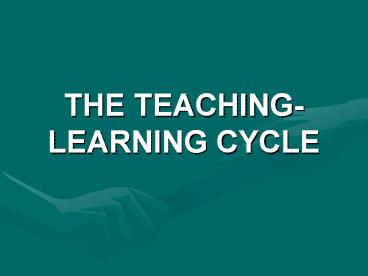THE TEACHING-LEARNING CYCLE - PowerPoint PPT Presentation
1 / 24
Title:
THE TEACHING-LEARNING CYCLE
Description:
THE TEACHING-LEARNING CYCLE VYGOTSKY- Sociocultural Theory the child is viewed as an active seeker of knowledge; the child and environment interact together enabling ... – PowerPoint PPT presentation
Number of Views:130
Avg rating:3.0/5.0
Title: THE TEACHING-LEARNING CYCLE
1
THE TEACHING-LEARNING CYCLE
2
VYGOTSKY- Sociocultural Theory
- the child is viewed as an active seeker of
knowledge - the child and environment interact together
enabling cognitive development in a culturally
adaptive way - the mind is perceived to be socially constructed
- the child is born with basic attention,
perceptual and memory capacities
3
- development occurs as a direct result of contact
with the environment - child as self communicator leads to higher
order thinking - language and thought develop independently, but
eventually merge and interact
4
PRIVATE SPEECH
- Vygotsky believed that in
- order to learn children must
- speak to themselves in a self
- guiding and directing way
- initially aloud and later
- internally.
5
- ..as children develop and
- become more competent in a
- particular area, they begin to
- internalise this speech and
- gradually decrease its use
6
- private speech is the foundation for all higher
- order thinking processes
7
Now where did I put the car keys., Now I must
remember to..
- Vygotsky believed that children's
- use of such talk in daily learning
- tasks was particularly significant in
- working with difficult concepts.
8
- Vygotskys Sociocultural
- Theory discusses
- cognitive development as
- dependent on interaction
- with adults.
9
- THE ZONE OF PROXIMAL
- DEVELOPMENT refers to the tasks
- a child is unable to complete alone,
- but is able to complete with the
- assistance of an adult.
10
- child and the teacher engage in cooperative
- dialogues to enhance learning that the child
- is able to recall privately when completing a
- similar task/activity independently. Therefore
- the child takes in the discussion of the
- task/activity and uses it as private speech on
- later occasions.
11
- SCAFFOLDING
12
- Vygotskys notion of
- scaffolding directly relates to
- his notions of Private Speech
- and the Zone of Proximal
- Development.
13
- In order for a child to learn new
- concepts or skills the teacher
- must provide scaffolds for the
- learning experience.
14
- scaffolding is withdrawn as
- individual competence
- develops
15
- What are the Educational implications?
16
- the student is an active participant in the
learning process. - individual differences are accounted for.
- children are assisted in discovery.
17
- teachers guide learning through explanation,
demonstration and verbal prompts. - lessons can be tailored to each child's zone of
proximal development. - promote teacher/child and child/child
interactions.
18
- promote fantasy play.
- within the learning environment focus on literacy
activities. - use prompts, reminders, increase independence,
give information, use cooperative learning and
reciprocal teaching strategies.
19
(No Transcript)
20
THE TEACHING-LEARNING CYCLE (TLC!!!!!)
- BUILDING THE FIELD
- MODELLING / DECONSTRUCTION
- JOINT CONSTRUCTION
- INDEPENDENT CONSTRUCTION
21
SCAFFOLDING IN THE CLASSROOM
- Challenges and extends learner
- High challenge and high support new learning
takes place - Support gradually withdrawn as learners
increasingly become independent - Support provided at point of need
22
WHY IS IT USEFUL?
- Rationale and framework for sequence of teaching
and learning activities - Focus on language learning and learning about
language
23
- Pedagogy which scaffolds creates independent
learners - Flexible framework
24
Teaching English to Second Language Learners is
different because
- ..
- ..
- ..































